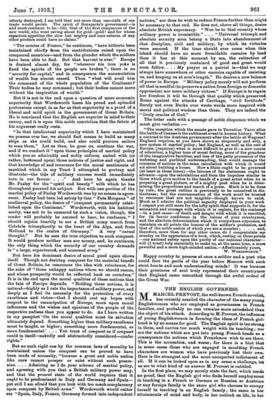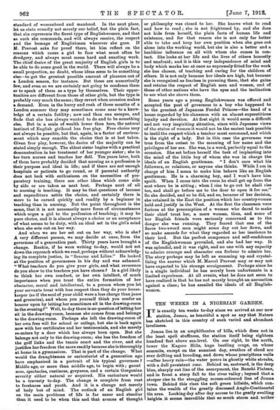THE ENGLISH GOVERNESS.
MARCEL PREVOST, the well-known French novelist, M
has recently assailed the character of the many young Englishwomen who are employed as governesses in French families, and probably no one remains more astonished than the object of his attack. According to M.Prevost, the influence of young Englishwomen in forming the ideas of French girl- hood is by no means for good. The English spirit is too strong in them, and carries too much weight with its teaching ; not are the notions which are put into young French heads as a consequence the notions which Frenchmen wish to see there. This is the accusation, and worse ; for there is a hint that in some cases those who are engaged in moulding French characters are women who have previously lost their own. Here is the strangest and the most unexpected indictment of all. If it can be looked upon as in any sense a challenge, let us see to what kind of an answer M. Prevost is entitled.
In the first place, we may merely state the fact, which needs no proof, that the English girl who finds herself employment in teaching in a French or German or Russian or Austrian or any foreign family is the same girl who chooses to occupy herself in teaching in an English family ; the same in her attainments of mind and body, in her outlook on life, in her standard of womanhood and manhood. In the next place, let us state roundly not merely our belief, but the plain fact, that she represents the finest type of Englishwoman, and that as such she commands, and will always receive, the respect and the homage of Englishmen wherever she goes. If M. Prevost asks for proof there, let him reflect on the reasons which cause a girl to face what must often be drudgery, and always must mean hard and exacting work. The chief desire of the great majority of English girls is to be able to do some good in the world. There will always be a small proportion, no doubt, whose ideas seem to be something else—to get the greatest possible amount of pleasure out of a London season, for instance. But these are numerically few, and even so we are certainly not going to condemn them or to speak of them as a type by themselves. Their oppor- tunities are different from those of other girls, but the type is probably very much the same ; they revert when occasion makes a demand. Even in the hurry and rush of three months of a London summer they may sometimes come near to a know- ledge of a certain futility ; now and then one escapes, and finds that she has always wanted to do and to be something else. But in a scale of wealth lower than hers, the natural instinct of English girlhood has free play. Free choice may not always be possible, but that, again, is a factor of environ- ment which may ennoble the choice that is at last taken. Given free play, however, the desire of the majority can be stated simply enough. The eldest sister begins with a practical demonstration in her treatment of her younger sister ; she in her turn nurses and teaches her doll. Ten years later, both of them have probably decided that nursing as a profession is their purpose and ideal in life; and if there are not enough hospitals or patients to go round, or if parental authority does not look with enthusiasm on the necessities of pre- paratory training, there are other ideas which come side by side or are taken as next best. Perhaps next of all to nursing is teaching. It may be that questions of income and expenditure settle the choice, and certainly there is more to be earned quickly and readily by a beginner in teaching than in nursing. But the point throughout is the same, that it is not necessarily mere force of circumstances which urges a girl to the profession of teaching; it may be pure choice, and it is almost always a choice or an acceptance of what seems to be duty, with an ideal set in the girl's mind when she sets out on her way.
And when we see her set out on her way, who is she ? A very different person, we may decide at once, from the governess of a generation past. Thirty years have brought a change. Ruskin, if he were writing to-day, would not set down the reproach which we read, perhaps without acknowledg- ing its complete justice, in " Sesame and Lilies." He looked at the position of governesses in his day and was ashamed. "What teachers do you give your girls, and what reverence do you show to the teachers you have chosen ? Is a girl likely to think her own conduct, or her own intellect, of much importance when you trust the entire formation of her character, moral and intellectual, to a person whom you let your servants treat with less respect than they do your house- keeper (as if the soul of your child were a less charge than jams and groceries), and whom you yourself think you confer an honour upon by letting her sometimes sit in the drawing-room in the evening ?" Well, to-day there is no question of letting her sit in the drawing-room, because she comes from and belongs to the drawing-room. Perhaps she left the drawing-room of her own free will for school or college, but she is back again now with her certificates and her testimonials, and she merely re-enters by a door which has always been open. But she belongs not only to the drawing-room; she has the freedom of the golf links and the tennis court and the river, and she justifies her freedom the more readily because she is thoroughly at home in a gymnasium. That is part of the change. What would the draughtsman or caricaturist of a generation ago have emphasized in a portrait of his typical governess ? Middle age, or more than middle age, to begin with ; gaunt ness, spectacles, rustiness, greyness, and a certain Gorgonian severity either natural or acquired. His caricature would be a travesty to-day. The change is complete from rust to freshness and youth. And it is a change not merely of body but of mind. The outlook of an English girl on the main problems of life is far saner and steadier than it used to be when this and that avenue of thought or philosophy was closed to her. She knows what to read and how to read ; she is not frightened by, and she does not hide from herself, the plain facts of human life and existence, and for that reason she is not only far better able to take and keep her own position when she goes out alone into the working world, but she is also a better and a healthier influence on all with whom she comes in con- tact. She looks at her life and the lives of others honestly and unafraid; and it is this very independence of mind and body which marks her at once as supremely fitted for the work she has chosen, of teaching and caring for the children of others. It is not only because her ideals are high, but because she is recognized as fearless in pursuing them, that she gains and retains the respect of English men and women, and of those of other nations who have the eyes and the inclination to see what she shows them.
Some years ago a young Englishwoman was offered and accepted the post of governess to a boy who happened to be the greatest of Japanese Feudal Princes—the head of a house regarded by his clansmen with an almost superstitions loyalty and devotion. At first sight it would seem a difficult and not very inspiriting situation, since with Japanese views of the status of women it would not be the easiest task possible to instil the respect which a teacher must command, and which is the right of a lady. But in this case the governess was true from the outset to the meaning of her name and the privileges of her sex. She was, in a word, perfectly equal to the occasion. She set before herself the task of implanting into the mind of the little boy of whom she was in charge the ideals of an English gentleman. " I don't care what his followers, or relations, or anyone else thinks. While I am in charge of him I mean to make him behave like an English gentleman. He is a charming boy, and I won't have him spoilt. When I come into the room he shall get up from the seat where he is sitting ; when I rise to go out he shall rise too, and shall go before me to the door to open it for me." So she decided, and so he did, and so, because of her decision, she retained in the East the position which her countrywomen hold and justify in the West. At the first the clansmen were furious at the presumption of a woman who dared to make their chief treat her, a mere woman, thus, and some of her English friends were seriously concerned as to the danger she was running. They feared that one of the fierce two-sword men might some day cut her down, and so make amends for what they regarded as her insolence to their lord. But the perfect composure and self-confidence of the Englishwoman prevailed, and she had her way. It was splendid, and it was right, and no one with any capacity to admire courage and character can forbear to admire her. The story perhaps may be left as summing up and crystal- lizing the answer which M. Marcel Prevost may or may not have expected to his strange arraignment. Perhaps since he is a single individual he has merely been unfortunate in a limited experience. At all events, what he does not seem to have realized is that he has not merely brought an accusation against a class; he has assailed the ideals of all English. women.















































 Previous page
Previous page